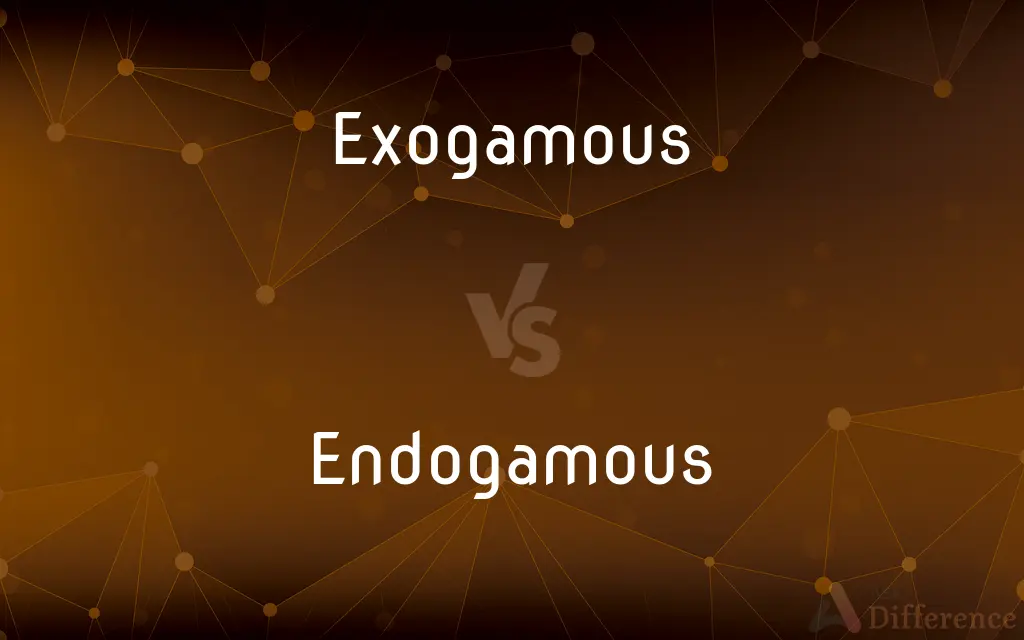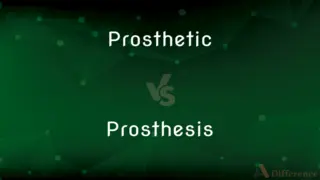Exogamous vs. Endogamous — What's the Difference?
By Tayyaba Rehman — Updated on November 4, 2023
Exogamous societies require marriage outside a certain group; endogamous societies require marriage within the group.

Difference Between Exogamous and Endogamous
Table of Contents
ADVERTISEMENT
Key Differences
Exogamous societies promote marriage outside of a specific social group or community, encouraging genetic diversity and social alliances. Endogamous societies, by contrast, require individuals to marry within their own social group, be it caste, class, or ethnicity, thus maintaining cultural unity and property within the group.
An exogamous rule might stipulate that one cannot marry within their own clan or tribe, to prevent genetic problems associated with inbreeding. Conversely, an endogamous community might insist on marriages within the same caste or religion to preserve social structures and continuity of cultural or religious practices.
The practice of exogamy can be seen in many historical aristocracies where dynastic ties were important for power and peace; royalty would often seek spouses from foreign lands or other ruling families. Endogamy is often practiced in traditional Jewish, Hindu, or aristocratic European communities where marrying within the same faith, caste, or social circle is deeply ingrained.
Exogamy can be associated with more liberal and often urban communities that value cultural exchange and adaptability. In contrast, endogamous practices are often found in conservative or rural communities where preserving tradition is a strong social force.
In an exogamous society, the prohibition against marrying within certain groups can strengthen bonds between different communities. On the other hand, endogamous societies often have strong inner cohesion and a clear sense of identity due to their marriage practices.
ADVERTISEMENT
Comparison Chart
Marriage Rule
Marry outside specific groups.
Marry within specific groups.
Purpose
Promote diversity and alliances.
Preserve culture and continuity.
Typical Societal Type
Liberal, urban societies.
Conservative, rural societies.
Social Structure Impact
Creates wider social networks.
Reinforces existing social structures.
Genetic Diversity
Higher due to outbreeding.
Lower due to inbreeding.
Compare with Definitions
Exogamous
Relating to marriage outside a particular group.
In their exogamous society, marrying a distant cousin was not just uncommon but taboo.
Endogamous
Requiring marriage within a specific social group.
Their village’s endogamous norms meant she was expected to marry a local.
Exogamous
Pertaining to out-marriage norms.
The tribe's exogamous customs led him to seek a partner from a different region.
Endogamous
Designed to maintain cultural homogeneity.
Endogamous marriage practices helped preserve their cultural traditions.
Exogamous
Encouraging genetic diversity through marriage.
Their exogamous policies ensured a wide mix of genetic backgrounds in the population.
Endogamous
Pertaining to in-marriage customs.
The community's endogamous rules often led to cousins marrying each other.
Exogamous
Characterized by external social alliances.
The exogamous alliances between the clans prevented conflicts and promoted peace.
Endogamous
Involving marriage within a defined community.
He adhered to his culture's endogamous expectations by marrying within his caste.
Exogamous
(Anthropology) The custom of marrying outside the tribe, family, clan, or other social unit.
Endogamous
(Anthropology) The custom of marrying within a particular social or cultural group in accordance with custom or law.
Exogamous
(Biology) The fusion of gametes from individuals that are not closely related, as in outbreeding.
Endogamous
(Biology) Reproduction by the fusion of gametes of similar ancestry, as in self-pollination or inbreeding.
Exogamous
Of or relating to exogamy.
Endogamous
(of a marriage) Taking place within a social group.
Many recent immigrants' marriages are endogamous.
Exogamous
Relating to exogamy; marrying outside of the limits of one's own tribe; - opposed to endogenous.
Endogamous
Marrying within the same tribe; - opposed to exogamous.
Exogamous
Characterized by or fit for fertilization by pollen from another flower of the same kind
Endogamous
Characterized by or fit for fertilization by a flower that is not closely related
Exogamous
Pertaining to or characterized by the custom of marrying only outside the limits of a clan or tribe
Endogamous
Pertaining to or characterized by the custom of marrying only within the limits of a clan or tribe
Exogamous
Preventing inbreeding by societal rules.
Exogamous rules in her culture were strict to avoid any close blood relations marrying.
Endogamous
Fostering strong group identity through marriage.
Endogamous marriages in the community reinforced a strong sense of identity.
Common Curiosities
What is an endogamous practice?
Endogamous practice involves marrying within one's own social, cultural, or ethnic group.
What does exogamous mean?
Exogamous refers to a social system where marriage outside a specific group is required.
What is the rationale behind endogamous marriages?
Endogamous marriages aim to preserve cultural or religious identity and maintain social cohesion.
What is an example of an exogamous rule?
An exogamous rule may forbid individuals from marrying within their own clan or tribe.
Are there religious aspects to exogamous traditions?
Some religions may promote exogamous traditions to broaden community ties.
Can a society be both exogamous and endogamous?
Generally, societies adopt one practice or the other, though subgroups within may differ.
Does endogamy affect genetic variation?
Yes, endogamy can decrease genetic variation and increase the prevalence of certain genetic traits.
What are the benefits of exogamous marriages?
Exogamous marriages can increase genetic diversity and foster broader social alliances.
Are arranged marriages typically endogamous?
Many arranged marriages are endogamous, emphasizing cultural, caste, or religious similarities.
Is exogamy more common in modern societies?
Exogamy is often more prevalent in modern, urbanized societies valuing diversity.
Can endogamy be legally enforced?
While not typically enforced by law, endogamy can be a strong social expectation.
Is caste an example of endogamous restriction?
Yes, caste systems often require endogamous marriages within the same caste.
What are the challenges of exogamous marriage?
Exogamous marriage can challenge couples with cultural integration and acceptance issues.
How do individuals choose partners in endogamous societies?
In endogamous societies, partner choice is often limited to within the community or social group.
How does endogamy influence social structure?
Endogamy reinforces existing social structures by encouraging intra-group marriage.
Share Your Discovery

Previous Comparison
Curmudgeonly vs. Cantankerous
Next Comparison
Prosthetic vs. ProsthesisAuthor Spotlight
Written by
Tayyaba RehmanTayyaba Rehman is a distinguished writer, currently serving as a primary contributor to askdifference.com. As a researcher in semantics and etymology, Tayyaba's passion for the complexity of languages and their distinctions has found a perfect home on the platform. Tayyaba delves into the intricacies of language, distinguishing between commonly confused words and phrases, thereby providing clarity for readers worldwide.
















































